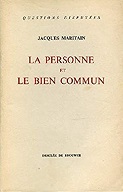 Cover of the first edition | |
| Author | Jacques Maritain |
|---|---|
| Original title | La personne et le bien commun |
| Translator | John J. Fitzgerald |
| Language | French |
| Subject | Social philosophy |
| Published | 1947 |
| Publication place | France |
| Media type | |
| ISBN | 978-0268002046 |
The Person and the Common Good (French : La personne et le bien commun) is a 1947 book about social philosophy by the French philosopher and theologian Jacques Maritain.